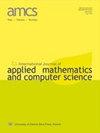GrDBSCAN: A Granular Density–Based Clustering Algorithm
IF 1.2
4区 计算机科学
Q3 AUTOMATION & CONTROL SYSTEMS
International Journal of Applied Mathematics and Computer Science
Pub Date : 2023-06-01
DOI:10.34768/amcs-2023-0022
引用次数: 1
Abstract
Abstract Density-based spatial clustering of applications with noise (DBSCAN) is a commonly known and used algorithm for data clustering. It applies a density-based approach and can produce clusters of any shape. However, it has a drawback—its worst-case computational complexity is O(n2) with regard to the number of data items n. The paper presents GrDBSCAN: a granular modification of DBSCAN with reduced complexity. The proposed GrDBSCAN first granulates data into fuzzy granules and then runs density-based clustering on the resulting granules. The complexity of GrDBSCAN is linear with regard to the input data size and higher only for the number of granules. That number is, however, a parameter of the GrDBSCAN algorithm and is (significantly) lower than that of input data items. This results in shorter clustering time than in the case of DBSCAN. The paper is accompanied by numerical experiments. The implementation of GrDBSCAN is freely available from a public repository.GrDBSCAN:基于颗粒密度的聚类算法
基于密度的带噪声应用空间聚类(DBSCAN)是一种常用的数据聚类算法。它采用基于密度的方法,可以产生任何形状的簇。然而,它有一个缺点——它的最坏情况计算复杂度是0 (n2),相对于数据项的数量n。本文提出了GrDBSCAN:一种对DBSCAN的粒度修改,降低了复杂度。提出的GrDBSCAN首先将数据划分为模糊颗粒,然后对生成的颗粒进行基于密度的聚类。GrDBSCAN的复杂度与输入数据大小成线性关系,只对颗粒的数量高。然而,这个数字是GrDBSCAN算法的一个参数,并且(明显)低于输入数据项的数值。这将导致比DBSCAN更短的聚类时间。本文附有数值实验。GrDBSCAN的实现可以从公共存储库免费获得。
本文章由计算机程序翻译,如有差异,请以英文原文为准。
求助全文
约1分钟内获得全文
求助全文
来源期刊
CiteScore
4.10
自引率
21.10%
发文量
0
审稿时长
4.2 months
期刊介绍:
The International Journal of Applied Mathematics and Computer Science is a quarterly published in Poland since 1991 by the University of Zielona Góra in partnership with De Gruyter Poland (Sciendo) and Lubuskie Scientific Society, under the auspices of the Committee on Automatic Control and Robotics of the Polish Academy of Sciences.
The journal strives to meet the demand for the presentation of interdisciplinary research in various fields related to control theory, applied mathematics, scientific computing and computer science. In particular, it publishes high quality original research results in the following areas:
-modern control theory and practice-
artificial intelligence methods and their applications-
applied mathematics and mathematical optimisation techniques-
mathematical methods in engineering, computer science, and biology.

 求助内容:
求助内容: 应助结果提醒方式:
应助结果提醒方式:


